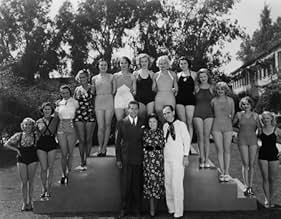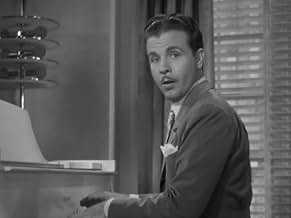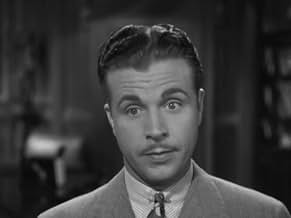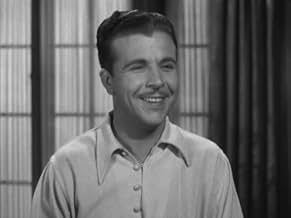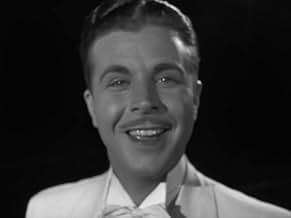ÉVALUATION IMDb
6,4/10
1,3 k
MA NOTE
Ajouter une intrigue dans votre langueWhen two investors inform an opportunistic dancer that they can't fund an elderly stage producer's production, she suggests they get an insurance policy on the producer's life.When two investors inform an opportunistic dancer that they can't fund an elderly stage producer's production, she suggests they get an insurance policy on the producer's life.When two investors inform an opportunistic dancer that they can't fund an elderly stage producer's production, she suggests they get an insurance policy on the producer's life.
- Nommé pour 1 oscar
- 2 victoires et 1 nomination au total
Charles D. Brown
- Hugo
- (as Chas. D. Brown)
William B. Davidson
- Andy Callahan
- (as Wm. Davidson)
Bobbie Adams
- Chorus Girl
- (uncredited)
Iris Adrian
- Verna
- (uncredited)
Avis en vedette
The heyday of the Warner Bros./Busby Berkeley musicals was on the wane by 1936. While the key films of the series ("42nd Street" [1933], "Gold Diggers of 1933" [1933]) dealt with putting on a show, and the numbers being parts of that show, Hollywood musicals by the mid-30s were starting to shift to "book numbers," with characters singing and dancing when they should have been talking or walking. "Gold Diggers of 1937" is an attempt by Berkeley to follow this trend, but still hang onto what had worked in the past for him. So there are book numbers and at least one major "show number." The results are middling.
Another factor that gave the WB/Berkeley musicals so much energy was the tough talk and slightly risque innuendo that was sparked by the desperation of the dark days of the Depression. By 1936, there were specific factors in place to reign this in. The Production Code was now enforced, keeping the Hollywood studios from including the overtly sexual material that livened so many of Berkeley's numbers.
Also, with Roosevelt's election to president, popular opinion swayed from cynicism and frustration to hope and support of the system. The early Berkeley films were nothing if not an expression of hard-bitten despair. In "Gold Diggers of 1937," we still have women forced to use their sexuality on oily moneymen in order to survive economically (one actually says at one point, "It's so hard to be good under the capitalistic system"--Imagine!). But, unlike the early films in the series, this film wants you to feel sympathetic for the millionaire (instead of seeing him as the oppressor).
While the studio did give the film some strong stars, the budget seems somewhat lower than usual for Berkeley musicals--except for the final musical number, "All's Fair in Love and War." It's a real stunner--surreal, amazing visuals that stand up to comparison with just about any of Berkeley's greatest numbers. It's probably worth sitting through all of the forced comedy just to get to this one number.
Another factor that gave the WB/Berkeley musicals so much energy was the tough talk and slightly risque innuendo that was sparked by the desperation of the dark days of the Depression. By 1936, there were specific factors in place to reign this in. The Production Code was now enforced, keeping the Hollywood studios from including the overtly sexual material that livened so many of Berkeley's numbers.
Also, with Roosevelt's election to president, popular opinion swayed from cynicism and frustration to hope and support of the system. The early Berkeley films were nothing if not an expression of hard-bitten despair. In "Gold Diggers of 1937," we still have women forced to use their sexuality on oily moneymen in order to survive economically (one actually says at one point, "It's so hard to be good under the capitalistic system"--Imagine!). But, unlike the early films in the series, this film wants you to feel sympathetic for the millionaire (instead of seeing him as the oppressor).
While the studio did give the film some strong stars, the budget seems somewhat lower than usual for Berkeley musicals--except for the final musical number, "All's Fair in Love and War." It's a real stunner--surreal, amazing visuals that stand up to comparison with just about any of Berkeley's greatest numbers. It's probably worth sitting through all of the forced comedy just to get to this one number.
The snappy dialogue and pace of Berkeley's previous films are not to be found here--GD of '37 feels more like a Republic musical than a Warners one. The bankroll went to the one big Berkeley number at the end--"All Is Fair In Love and War." It's a simple piece, lines of chorus girls dressed in white against a shiny black floor, but it is simply astonishing (the song is pretty catchy too). There is also a nice little number with Powell and Blondell called "Speaking of The Weather"--an interesting attempt to seamlessly integrate a musical number into the plot. Among the mistakes (besides the script) is the short-shrift given to the best, most popular song in the film--"With Plenty of Money and You."
Busby Berkeley's films are the most concentrated tease in the history of movies. it is over an hour into 'Gold Diggers of 1937' before we get any real meat - an astonishing, gossamer-erotic Gatsby-orgy filmed in the manner of Riefenstahl, all glowing Aryan bodies with their glistening mammillae, and idealised framing; with the kind of multi-character cutting of a song Paul Thomas Anderson would borrow for 'Magnolia'; and a magnificent extended tap-dance leading to an agreeable Berkeley fancy, the huge male dancer hand-standing over a bridge of female arms like a fly evading a web - after two tantalising duets featuring Dick Powell and Ruby Keeler that threaten to explode into full-blown imaginative hysteria, but are cut short.
Of course, this is the Berkeley method - coitus interruptus - and our deferred gratification is mirrored in a plot where the hero must prove himself worthy of the heroine before he can have her; the final extravaganza thus functions as a sexual/marriage rite, concluding in a consummating kiss. And what an extravaganza it is - less overt than '1935', but full of fetishised phallic implements, swirling clitoral circles and rocking chairs. Against a sharp black background, our phosphorescent heroes play out their immemorial rites, the heterosexual struggle linked to war (and not to the men's advantage). This idea leads to some striking sequences, including a priapic cannon with a pair of adjacent ball-piles, and a scene of 'trench' warfare, where the skirted female soldiers in 'No Man's Land' triumph through a blitzkrieg of firearms and perfume. There is no way actual sex could ever be better than this.
It is traditional in celebrating Busby Berkeley movies to denigrate the plots as amiable, necessary time-passers before the visual disruption. I always find them highly entertaining, and '1937' has one of the best: an excellently plotted farce combining gold-diggers, an inept salesman, a hypochondriac theatre impressario and his corrupt sidekicks.
This fun plot is noticeable for two things - the extraordinary sexual honesty that persists in spite of Messrs. Hays' and Breen's best efforts: this is a Depression where a woman must prostitute herself for a meal, never mind a marriage; as Glenda Farrell says 'It is so hard to be good under the capitalistic system' (!). The film opens with Powell insisting on the link between financial security and marriage, and the glistening sea of gold moistening the opening credits certainly have a sexual force.
More enjoyable is the portrait of the two heels who try to kill their boss having lost all his money in a Stock Exchange scam, hoping to cash in on his insurance. this kind of plot is quite shocking in such a genre, and we are expected to laugh at various unsuccessful murder attempts (and we do: the whispers for help when they hurl JJ into the pool are hilarious). These are not cartoon villains but the kind of middle-aged, middle class men we might meet in film noir or the novels of Simenon, men whose souls have been made hard by routine, and the American insistence on success. They would have made good collaborators.
In 1933, the 'Gold Diggers' poignantly recorded the effects of the Depression: things haven't really improved four years later, but, significantly, the idea is emerging that if you throw enough razzmatazz, noise, bands and empty phrases at a problem it will go away. it's not for nothing that the two leads are an insurance man and an actress. Powell is amiable in a silly moustache, sillier name and a cheerful pessimism; Blondell is bubbly and serious and lovely as ever; the revelation, however, are Glenda Farrell, convincingly transforming from cynical modern woman to accomplice of scoundrels to loving wife; and Victor Moore, as the inimitable, whining, lonely JJ.
Of course, this is the Berkeley method - coitus interruptus - and our deferred gratification is mirrored in a plot where the hero must prove himself worthy of the heroine before he can have her; the final extravaganza thus functions as a sexual/marriage rite, concluding in a consummating kiss. And what an extravaganza it is - less overt than '1935', but full of fetishised phallic implements, swirling clitoral circles and rocking chairs. Against a sharp black background, our phosphorescent heroes play out their immemorial rites, the heterosexual struggle linked to war (and not to the men's advantage). This idea leads to some striking sequences, including a priapic cannon with a pair of adjacent ball-piles, and a scene of 'trench' warfare, where the skirted female soldiers in 'No Man's Land' triumph through a blitzkrieg of firearms and perfume. There is no way actual sex could ever be better than this.
It is traditional in celebrating Busby Berkeley movies to denigrate the plots as amiable, necessary time-passers before the visual disruption. I always find them highly entertaining, and '1937' has one of the best: an excellently plotted farce combining gold-diggers, an inept salesman, a hypochondriac theatre impressario and his corrupt sidekicks.
This fun plot is noticeable for two things - the extraordinary sexual honesty that persists in spite of Messrs. Hays' and Breen's best efforts: this is a Depression where a woman must prostitute herself for a meal, never mind a marriage; as Glenda Farrell says 'It is so hard to be good under the capitalistic system' (!). The film opens with Powell insisting on the link between financial security and marriage, and the glistening sea of gold moistening the opening credits certainly have a sexual force.
More enjoyable is the portrait of the two heels who try to kill their boss having lost all his money in a Stock Exchange scam, hoping to cash in on his insurance. this kind of plot is quite shocking in such a genre, and we are expected to laugh at various unsuccessful murder attempts (and we do: the whispers for help when they hurl JJ into the pool are hilarious). These are not cartoon villains but the kind of middle-aged, middle class men we might meet in film noir or the novels of Simenon, men whose souls have been made hard by routine, and the American insistence on success. They would have made good collaborators.
In 1933, the 'Gold Diggers' poignantly recorded the effects of the Depression: things haven't really improved four years later, but, significantly, the idea is emerging that if you throw enough razzmatazz, noise, bands and empty phrases at a problem it will go away. it's not for nothing that the two leads are an insurance man and an actress. Powell is amiable in a silly moustache, sillier name and a cheerful pessimism; Blondell is bubbly and serious and lovely as ever; the revelation, however, are Glenda Farrell, convincingly transforming from cynical modern woman to accomplice of scoundrels to loving wife; and Victor Moore, as the inimitable, whining, lonely JJ.
...from Warner Brothers/First National, director Lloyd Bacon, and dance choreographer/director Busby Berkeley. A group of showgirls, including Norma (Joan Blondell) and Genevieve (Glenda Farrell), grow tired of struggling with poverty, so they set out to change their circumstances. Norma meets insurance salesman Rosmer Peak (Dick Powell), and he gets her a job at his firm. Genevieve falls in with shady theatrical bookkeeper Morty (Osgood Perkins) who's trying to get out from under the debt of theater owner J.J. Hobart (Victor Moore), and who concocts a plan that brings them into contact with Rosmer and Norma.
The musical format had started to change in cinema by this point. Whereas previous films had largely kept musical numbers confined to the stage on which they were ostensibly being shown to the "audience" within the film's narrative, now more and more songs were being performed out "in the world", with characters breaking out into song while walking down the street or sitting in a park. Berkeley's only major number comes at the very end, an elaborate fantasia that is supposedly being viewed by a theater audience but actual defies all physics of reality. It's interesting to look at, but isn't terribly inspired. Dixon, who I'm unfamiliar with, gets a couple of tap-dancing showcases, including one on a giant rocking chair seat. I enjoyed Moore, and I always welcome Blondell and Farrell, but the movie is only passable. Berkeley earned an Oscar nomination for Best Dance Direction. Look out for Carole Landis and Jane Wyman among the chorus girls.
The musical format had started to change in cinema by this point. Whereas previous films had largely kept musical numbers confined to the stage on which they were ostensibly being shown to the "audience" within the film's narrative, now more and more songs were being performed out "in the world", with characters breaking out into song while walking down the street or sitting in a park. Berkeley's only major number comes at the very end, an elaborate fantasia that is supposedly being viewed by a theater audience but actual defies all physics of reality. It's interesting to look at, but isn't terribly inspired. Dixon, who I'm unfamiliar with, gets a couple of tap-dancing showcases, including one on a giant rocking chair seat. I enjoyed Moore, and I always welcome Blondell and Farrell, but the movie is only passable. Berkeley earned an Oscar nomination for Best Dance Direction. Look out for Carole Landis and Jane Wyman among the chorus girls.
The next to last of the Gold Digger films finds Dick Powell as a rather unenthusiastic insurance salesman who'd rather be in show business, roped into selling an insurance policy to hypochondriac Broadway producer Victor Moore.
Moore's got bigger problems than imaginary illnesses. He's got a couple of crooked partners in Charles D. Brown and Osgood Perkins. They've taken money from Moore and put in some stock that went belly up. Now to get the money back they have a scheme to insure Moore and then maybe push him along into eternity. In fact they almost trip him into it during the film.
Joan Blondell is a former chorus girl now turned stenographer at the insurance company office and she gets her friends together with Powell and Lee Dixon from the company and they help Moore out.
Gold Diggers of 1937 doesn't have quite the madcap lunacy of the 1935 edition, but still there's a lot of entertainment there. Busby Berkeley gets only two numbers here to demonstrate is creativity, Let's Put Our Heads Together and the finale All's Fair in Love and War. Powell solos with With Plenty of Money and You and he duets with current wife Blondell in Speaking of the Weather.
Lee Dixon was a very talented dancer who graced a few musical films and then went east to Broadway and made his biggest splash as Will Parker in the original production of Oklahoma. Dixon died tragically young in 1953. I think he should have gotten some recognition from the Academy for having the nerve to go into this film playing a character named Boop Oglethorpe.
There was only one more round for the Gold Diggers as in their next film they went to Paris and it was ended after that. This version is entertaining enough, even if not up to 1933 or 1935.
Moore's got bigger problems than imaginary illnesses. He's got a couple of crooked partners in Charles D. Brown and Osgood Perkins. They've taken money from Moore and put in some stock that went belly up. Now to get the money back they have a scheme to insure Moore and then maybe push him along into eternity. In fact they almost trip him into it during the film.
Joan Blondell is a former chorus girl now turned stenographer at the insurance company office and she gets her friends together with Powell and Lee Dixon from the company and they help Moore out.
Gold Diggers of 1937 doesn't have quite the madcap lunacy of the 1935 edition, but still there's a lot of entertainment there. Busby Berkeley gets only two numbers here to demonstrate is creativity, Let's Put Our Heads Together and the finale All's Fair in Love and War. Powell solos with With Plenty of Money and You and he duets with current wife Blondell in Speaking of the Weather.
Lee Dixon was a very talented dancer who graced a few musical films and then went east to Broadway and made his biggest splash as Will Parker in the original production of Oklahoma. Dixon died tragically young in 1953. I think he should have gotten some recognition from the Academy for having the nerve to go into this film playing a character named Boop Oglethorpe.
There was only one more round for the Gold Diggers as in their next film they went to Paris and it was ended after that. This version is entertaining enough, even if not up to 1933 or 1935.
Le saviez-vous
- AnecdotesMultiple references to 'carloadings' being up, meaning an increase in the total amount of goods shipped by railroad. Back before stores and other businesses reported total monthly sales, carloadings was the best available measure of consumer spending.
- Gaffes(at around 20 min) A string used to make a stack of books fall onto Dick Powell's head is clearly visible against the white paper background.
- Citations
Rosmer Peak: Would you call Andy if I kiss you?
Norma Perry: Not unless you want to kiss him too.
- Générique farfeluThe usual disclaimer goes to great lengths to assure us that "The names of all characters -- The characters themselves -- The story - all incidents and institutions portrayed in this production are fictitious -- And no identification with actual persons, living or deceased, is intended or should be inferred."
- Autres versionsThere is an Italian edition of this film on DVD, distributed by DNA srl, "VIVA LE DONNE! (1933) + AMORE IN OTTO LEZIONI (1936)" (2 Films on a single DVD), re-edited with the contribution of film historian Riccardo Cusin. This version is also available for streaming on some platforms.
- ConnexionsEdited into Busby Berkeley and the Gold Diggers (1969)
- Bandes originalesWith Plenty of Money and You
(1936)
Music by Harry Warren
Lyrics by Al Dubin
Sung by Dick Powell (uncredited)
Meilleurs choix
Connectez-vous pour évaluer et surveiller les recommandations personnalisées
- How long is Gold Diggers of 1937?Propulsé par Alexa
Détails
- Date de sortie
- Pays d’origine
- Langue
- Aussi connu sous le nom de
- Gold Diggers of 1937
- Lieux de tournage
- société de production
- Consultez plus de crédits d'entreprise sur IMDbPro
- Durée1 heure 41 minutes
- Couleur
- Mixage
- Rapport de forme
- 1.37 : 1
Contribuer à cette page
Suggérer une modification ou ajouter du contenu manquant



